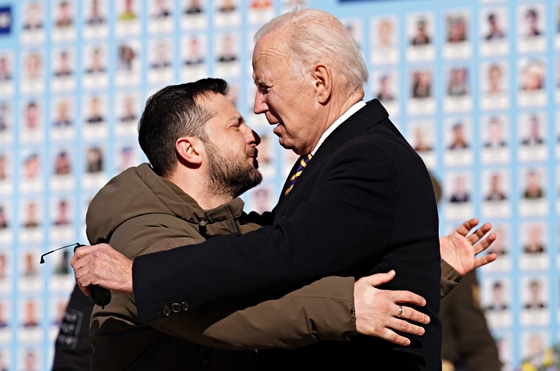All governments produce deceptive propaganda about aspects of their foreign policy. However, Joe Biden’s administration seems intent on setting some kind of record for both the number of falsehoods and their brazenness. Three of them stand out with respect to the latter feature.
Falsehood: The world is united in opposing Russia and supporting Ukraine. This boast had scant credibility even at the outset of the Russia-Ukraine war, and it has grown more frayed with the passage of time. The administration’s assertion is based on two UN General Assembly votes, one in March 2022 and the other in February 2023. Those measures did criticize Russia for its invasion of Ukraine, but they were purely symbolic, since they did not commit UN members to take any actions. Even so, more than 20 percent of the countries represented in the General Assembly cast negative votes or abstentions, despite knowing that such a stance would anger the powerful United States.
In terms of substantive policies, there has been little support for an anti-Russia policy outside of the NATO bloc and Washington’s long-standing security dependents in East Asia. Not only have major powers such as India and China refused to impose sanctions against Moscow, the overwhelming majority of countries throughout Asia, Africa, and Latin America also have maintained that posture. In terms of providing financial (much less military) aid to Kyiv, the ranks of supporters are even thinner. Contrary to the smug assertions of Biden administration officials, it is a case of the West versus the rest on such issues.
Falsehood: The Russia-Ukraine war is part of an existential global fight between democracy and authoritarianism. Administration leaders and their supporters in the West’s news media echo chamber have made that argument on numerous occasions. It is false on several grounds, not the least of which is the reality that Ukraine is not a democracy by any reasonable standard. Even before Volodymyr Zelensky’s government adopted additional repressive measures following Russia’s February 2022 invasion, Ukraine received poor marks from Transparency International because of pervasive corruption and a mediocre rating from Freedom House with respect to political liberties.
Since then, Zelensky has outlawed opposition parties and media outlets, imposed rigorous censorship on the rest of the press, effectively banned the Russian Orthodox Church and other religious organizations with “links to Russia,” and jailed numerous individuals (including former top aides) on allegations of treason. The regime even created a “blacklist” of both domestic and foreign critics, accusing them of being “disinformation terrorists” and “war criminals.”
It is absurd for the Biden administration to portray the Russia-Ukraine war as a crucial struggle between democracy and authoritarianism, when neither country is a democracy. Florida Governor Ron DeSantis was far closer to the mark when he initially described the conflict as a mundane “territorial dispute” that did not warrant US involvement. Unfortunately, it was a measure of how effectively the Ukraine lobby intimidates anyone who disputes the dominant pro-Kyiv narrative about the war that DeSantis later walked back that accurate characterization.
Falsehood: The United States is not directly involved in the Russia-Ukraine war. When the Russian invasion began, Biden administration officials quickly assured the American people that, while the United States and its NATO allies would assist Kyiv’s defense efforts, there would be no US”boots on the ground” in Ukraine. However, leaked Pentagon documents in April 2023 confirmed that the United States and several other NATO countries had dozens of Special Forces personnel in Ukraine. In a sarcastic comment about that revelation, one wag speculated that perhaps the US troops were wearing slippers instead of boots.
Even without a ground troop presence, the United States (along with other NATO members) has been deeply involved in the Russia-Ukraine conflict. Washington’s official status as a non-belligerentis farcical. NATO, led by the United States, has been waging a full-blown proxy war against Russia. Moreover, the apparent objective goes far beyond helping Ukraine fend off Russia’s aggression. Secretary of Defense Lloyd Austin candidly confirmed that point when he stated that Washington’s goal was to “weaken Russia” to the point that it could no longer pose a security threat to Ukraine or any other nation. The United States has pushed the International Criminal Court to prosecute Vladimir Putin for war crimes. Administration officials, including Biden, have hinted that NATO’s underlying goal is regime change in Moscow.
The Western powers have supplied Ukraine with increasingly powerful weapons, including longer-range missiles and heavy battle tanks. It is apparent that the United States also has given Ukraine battlefield intelligence, including targeting data. That assistance has enabled Kyiv’s forces to shoot down a Russian troop transport plane with hundreds aboard, kill numerous Russian generals, and sink the flagship of Russia’s Black Sea fleet, among other victories. Such involvement makes the United States a belligerent in the war, risking an incredibly dangerous clash with a nuclear-armed Russia.
The American people should not have to worry about being deceived by their own government. With respect to the Russia-Ukraine war, however, the Biden administration and its allies have systematically misled the public about several important issues. Such behavior exhibits utter contempt for fundamental democratic norms.
Reprinted with permission from Antiwar.com.


